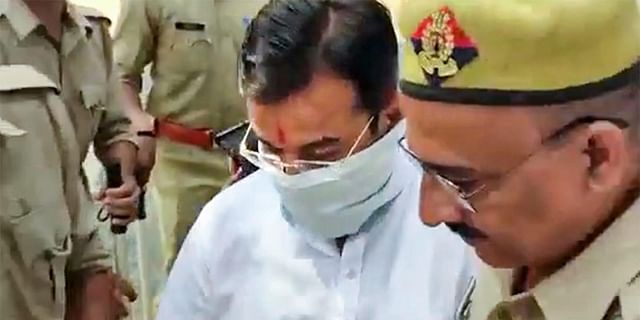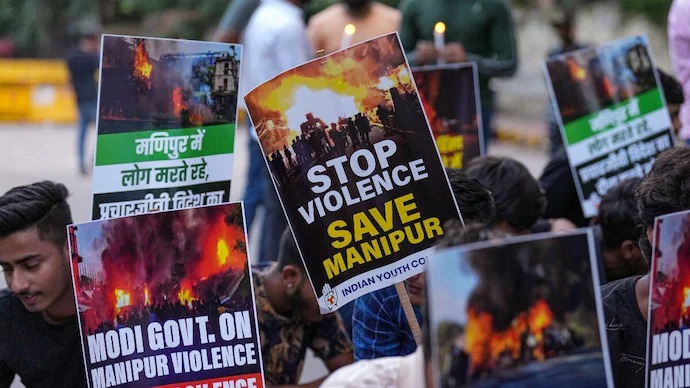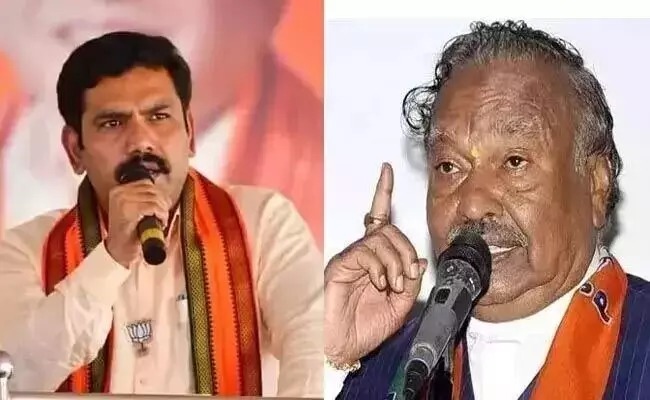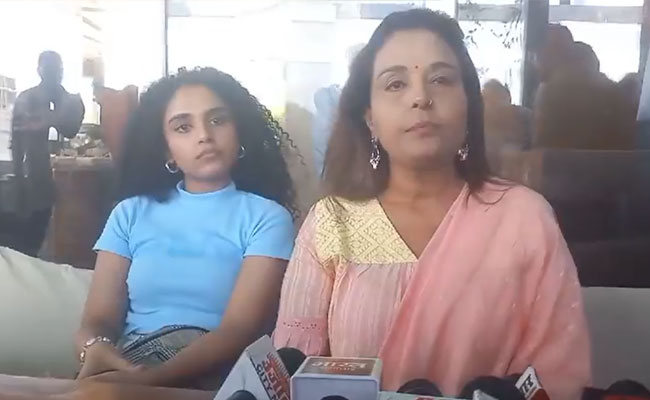Lakhimpur Kheri (UP), Oct 13: Two more persons were on Wednesday arrested in connection with the Lakhimpur violence, while a court here denied bail to the main accused, Ashish Mishra, son of Union minister Ajay Mishra.
Ankit Das and Latif alias Kale, who appeared before the Special Investigation Team (SIT), were taken in custody after questioning and produced in court which sent them in judicial remand for 14 days, official sources said.
With this, the total number of people arrested in connection with the mowing down of four farmers here on October 3 has gone to six.
While the police sought their custody for interrogation, their lawyer opposed it saying no recovery is to be done from them.
The court reserved its order on the application for police remand of the two, they said.
Senior prosecution officer (SPO) SP Yadav told PTI that Ashish Mishra and his alleged accomplice Ashish Pandey moved bail applications on Wednesday but they were rejected by Chief Judicial Magistrate Chinta Ram.
Ashish Mishra, who was arrested on October 9 by the special investigation team after 12 hours of questioning, had been sent to three days in police custody from Tuesday.
The court also remanded Shekhar Bharti, arrested on Tuesday, in police custody for three days.
Police have now arrested six people--Ashish Mishra, Luvkush, Ashish Pandey, Bharti, Ankit and Kale -- in connection with the case.
Ankit Das and Kale, who is said to be a close friend of Ashish Mishra, appeared before the SIT at the crime branch office in Lakhimpur earlier in the day.
The investigators had summoned Das and Kale for questioning in connection with the October 3 violence that had left eight people, including four farmers, dead.
Das is the nephew of former minister Akhilesh Das.
On Tuesday, Das and Kale had moved an application for surrender before the chief judicial magistrate.
Two BJP workers, a driver of the minister and a journalist were among those killed in the violence.
Let the Truth be known. If you read VB and like VB, please be a VB Supporter and Help us deliver the Truth to one and all.
New Delhi: New insights regarding the Manipur conflict have surfaced from an assessment conducted by Assam Rifles officials in the state.
The blame for much of the situation was directed towards Modi's "political authoritarianism and ambition," as well as the state government led by Chief Minister N Biren Singh, who supports the Hindu nationalist Bharatiya Janata Party (BJP).
The Assam Rifles, a paramilitary group under the federal government, has a contentious past. It is the oldest paramilitary force in the nation alongside the army and is responsible for maintaining law and order in the northeastern region.
The assessment, presented in a PowerPoint presentation in late 2023, was reviewed by The Reporters' Collective (TRC), though the officers who shared it chose to remain anonymous.
This marks the first public release of a report by a government body.
This development gains significance as Modi recently stated, just ahead of the upcoming general election, that the federal government's prompt actions had led to a "significant improvement" in the Manipur situation. The prime minister addressed the conflict briefly, marking one of the rare occasions he did so. Meanwhile, the Minister of Home Affairs Amit Shah has expressed confidence in the chief minister's role as a mediator, despite his lack of success in this regard. The state's two parliamentary constituencies are scheduled to vote in the initial phases of the national elections on April 19 and April 26.
The Kuki political and armed leadership is pushing for the separation of Kukiland as a distinct administrative region from Manipur, intensifying the ethnic conflict and sparking renewed calls for Kukiland during the ongoing unrest.
Moreover, the presentation highlighted that armed factions from the Kuki tribe were backing "volunteers," while militant groups from the Meitei community were supplying weapons to individuals. These developments have escalated tensions and impeded efforts by community leaders to frame the conflict as ordinary people defending themselves against the opposing community.
As per TRC's investigation, the Assam Rifles organization did not endorse the views expressed in the presentation.
However, Al Jazeera has independently examined the presentation and confirmed its authenticity.
The root cause of the violence is often attributed to the Meitei community's push for Scheduled Tribe status, which entails affirmative action benefits like government job quotas and college admissions. However, this move is rejected by other tribal groups, notably the Kuki-Zo community.
Nevertheless, Assam Rifles representatives referenced the chief minister's policies in their presentation, which they believed exacerbated tensions between the groups. Singh's firm stance on combating the drug trade and addressing social media dissent were cited as contributing factors to the conflict, among other issues.
The presentation accused Singh of fostering discord among the communities through the state's efforts to curb drug production, trade, and sale in Manipur. His staunch opposition to poppy cultivation, particularly in the high-altitude areas bordering Myanmar, reinforced the perception that Kukis were being targeted.
The presentation also highlighted the "dismantling of the law-and-order apparatus" and the "implicit backing" of the violence by state forces.
It pointed to "Meitei Revivalism" as another factor fueling the violence. This term refers to the Meitei community's longstanding aspiration to reclaim its pre-Hindu identity, predating the introduction of Hinduism in the 18th century and Manipur's integration into India in 1949. This movement spurred armed resistance and revitalized Sanamahism in the 1930s.
Two Meitei organizations, Meitei Leepun and Arambai Tenggol, were identified in the presentation as instigators of the violence.
According to police sources, Arambai Tenggol was established in 2020 "under the guidance of the titular king of Manipur and BJP Member of Parliament Leishemba Sanajaoba."
Meitei Leepun, another recently formed group, is believed to be influenced by the ideology of the Rashtriya Swayamsevak Sangh (RSS), the umbrella organization for various radical Hindu groups, including the BJP. The leader of Meitei Leepun openly pledges allegiance to Meitei leader and BJP-backed state chief minister Biren Singh.
Kuki leaders have accused Meitei Leepun and Arambai Tenggol of orchestrating attacks on their community by the Meitei group. Arambai Tenggol advocates for a more assertive Meitei nationalist stance, distinct from Hinduism, while Meitei Leepun aligns with the Hindutva movement led by the RSS and BJP.
Under the leadership of Prime Minister Narendra Modi's Union government, the northeastern state of Manipur has been engulfed in what may be the country's longest-running ethnic conflict of the twenty-first century over the past 11 months.
The conflict has resulted in 60,000 displaced individuals, 1,100 injuries, and 219 fatalities. Various armed factions have reemerged, recruiting men and youths from both communities. In the Kangpokpi region of Manipur, two Kuki-Zo "village volunteers" were killed last Saturday, with reports indicating that their bodies were mutilated. Tribal organizations alleged in a press release that the killings were carried out by "central security forces, who aided Meitei militants."
The conflict is often oversimplified as a clash between the Christian Kuki-Zo and Hindu Meitei populations, reflecting the religious divisions seen in attacks on religious minorities and communal violence across India. Sanamahism, the indigenous faith of the Meitei group, is practiced alongside a syncretic version of Hinduism, while the Kuki-Zo communities are predominantly Christian. A smaller percentage of Meitei individuals identify as Muslims and Christians.
During the initial two months of the conflict, 7,831 incidents of vandalism and forced evictions were reported. Additionally, there were 189 cases of murder, assault (including sexual assault), injuries, and missing persons, along with 79 instances of widespread weapon theft.





